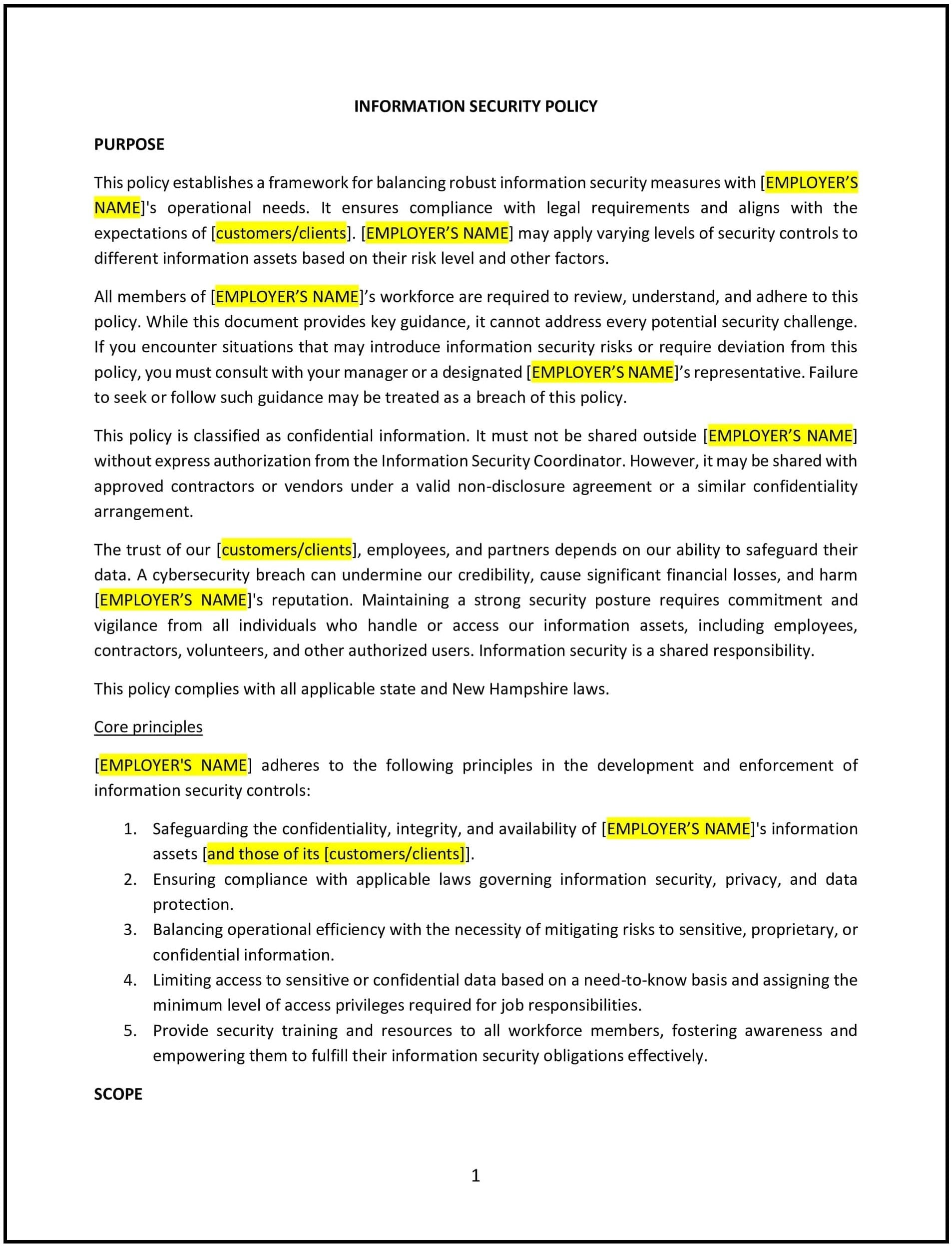Information security policy (New Hampshire): Free template
Got contracts to review? While you're here for policies, let Cobrief make contract review effortless—start your free review now.

Customize this template for free
Information security policy (New Hampshire)
An information security policy helps New Hampshire businesses protect sensitive data, intellectual property, and personal information from cyber threats, unauthorized access, and data breaches. This policy outlines the procedures for safeguarding business information, including data classification, access controls, and incident response strategies.
By adopting this policy, businesses in New Hampshire can reduce the risk of data breaches, enhance customer trust, and comply with data protection regulations while maintaining the confidentiality, integrity, and availability of critical business information.
How to use this information security policy (New Hampshire)
- Define information security objectives: Clearly outline the business's objectives for protecting information assets, including minimizing the risk of unauthorized access, loss, or misuse of sensitive data.
- Establish data classification standards: Categorize data based on its sensitivity level (e.g., public, internal, confidential) and provide guidelines for how each category of data should be handled, stored, and transmitted.
- Implement access controls: Specify how access to sensitive information will be granted, including password policies, authentication methods, and the principle of least privilege to ensure that only authorized individuals can access specific data.
- Outline data protection measures: Detail how the company will protect data through encryption, secure storage, regular backups, and secure communication channels.
- Define incident response protocols: Create a procedure for responding to information security incidents, including data breaches, cyberattacks, or unauthorized access, and designate individuals responsible for handling such incidents.
- Provide employee training: Offer ongoing training for employees on information security best practices, including recognizing phishing attempts, using strong passwords, and safeguarding sensitive data.
- Monitor and audit systems: Regularly monitor and audit systems for potential vulnerabilities, unauthorized access attempts, or compliance violations to identify and mitigate risks before they result in a security incident.
- Ensure third-party compliance: Establish guidelines for working with third-party vendors, ensuring that they follow information security standards that align with the company’s policy and protect sensitive data.
- Review and update: Regularly review and update the policy to reflect emerging threats, changes in business operations, and evolving data protection regulations.
Benefits of using this information security policy (New Hampshire)
This policy provides several benefits for New Hampshire businesses:
- Protects sensitive data: By securing confidential information, businesses reduce the risk of data breaches, intellectual property theft, and unauthorized access to personal or financial information.
- Enhances customer trust: Customers are more likely to trust businesses that take information security seriously, improving relationships and encouraging loyalty.
- Reduces the risk of legal issues: A clear information security policy helps businesses comply with data protection regulations, such as the General Data Protection Regulation (GDPR) or state-specific laws, reducing the risk of legal penalties.
- Improves business continuity: By having data protection and incident response procedures in place, businesses can quickly recover from security breaches and maintain operational continuity.
- Protects the company’s reputation: Effective information security policies help businesses avoid the reputational damage that can result from data breaches or loss of customer data.
Tips for using this information security policy (New Hampshire)
- Communicate the policy clearly: Ensure that all employees understand the importance of information security, the company's policies, and their responsibilities in safeguarding sensitive data.
- Provide regular training: Offer periodic training on information security best practices and the latest security threats to help employees stay informed and vigilant.
- Implement multi-factor authentication: Use multi-factor authentication (MFA) to enhance security by requiring more than one method of verifying the identity of users accessing sensitive systems or data.
- Perform regular risk assessments: Regularly assess the company’s information security risks, including potential vulnerabilities in systems and processes, and take steps to mitigate those risks.
- Work with trusted third parties: When engaging third-party vendors, ensure they adhere to the company’s information security standards to protect sensitive information.
- Stay up to date with security trends: Monitor evolving cyber threats, regulations, and best practices to keep the company’s security measures and policy up to date.